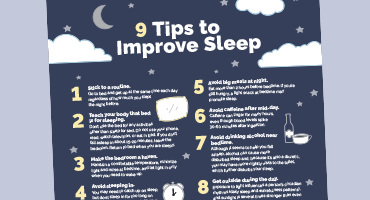Vital Links Between Sleep and GI Conditions
Sleep is essential for humans, but it’s no surprise that not all of us get what we need. Researchers tell us that sleep is vital for health and wellbeing no matter your age.1
Ensuring sufficient rest means we can be alert, perform efficiently, have regular reaction times, and consolidate learned information well. Health problems including heart disease, elevated stress hormones, and decreased immune function have links to insomnia, which is the inability to sleep when desired. However, setting aside serious sleep conditions such as insomnia, many people occasionally suffer from lack of, or inadequate, sleep.
During sleep, significant changes in motor, sensory, and physiological functions occur. We cycle through five distinct sleep stages three to five times each night. During the first four stages, heart rate and temperature drop, muscles relax, and brain waves slow down as we sink deeper and deeper into sleep. The fifth phase of sleep is rapid eye movement (REM), which is a shallow sleep stage when brain waves speed up to waking levels, eyes dart back and forth beneath the eyelids, and most of our dreams occur. Although a sleeping person may appear inactive, some functions of the brain and body become more active during sleep than while awake.
In this article, we discuss how the quality and duration of your sleep affects your digestive health and, conversely, how gastrointestinal (GI) conditions affect sleep. The data suggest that there are specific sleep-related consequences for several GI conditions, including gastroesophageal reflux disease, inflammatory bowel disease, irritable bowel syndrome, liver disease, microbiome disruption, and obesity. Sleep can even influence how viruses, such as COVID-19, affect you.
Effects of Sleep Deprivation
Sleep deprivation occurs when an individual does not get enough sleep. This can be due to many reasons, including sleep disorders, mental health conditions, poor sleep hygiene, stress, or a busy schedule that limits time for sleep, and it is becoming increasingly common as we spend more time both working and enjoying entertainment on smartphones. Over time, insufficient sleep, or sleep debt, impacts how an individual feels, behaves, and interacts with the world around them, which can lead to increased memory lapses, accidents and injuries, and behavioural and mood difficulties, with a profound and detrimental impact on physical health, mental health, and public safety.
Younger persons might be more likely to benefit from more sleep than those who are older, as inadequate sleep increases emotional loneliness. Promoting sleep health may be an untapped avenue to reduce loneliness and increase social engagement in all age groups, but especially in younger individuals.
Chronic sleep deficiency is a growing and underappreciated social determinant of health status. It is linked to several medical epidemics, including cardiovascular disease, diabetes, obesity, and cancer.2 Emerging data suggest that extending the nightly sleep duration of people who habitually get insufficient sleep is directly associated with health benefits.3 Some societal negative effects include motor vehicle crashes due to drowsy driving and workplace accidents.
GERD
Gastroesophageal reflux disease (GERD) occurs when the upper part of the digestive tract is not functioning properly, causing stomach contents to flow back into the esophagus.
Nighttime reflux can lead to sleep disturbance, and this can further aggravate GERD by prolonging acid contact time and heightening sensory perception, according to a study published in the Journal of Neurogastroenterology and Motility.8
Reflux is less frequent during sleep, but acid clearance mechanisms (including swallowing, salivation, and primary esophageal motility) are impaired during sleep, resulting in longer duration of acid contact time.
Inflammatory Bowel Disease
There is evidence to suggest that sleep abnormalities can influence the course of some chronic inflammatory conditions, including inflammatory bowel disease (IBD). In one study,9 when compared to healthy controls, IBD patients displayed “significantly prolonged sleep latency, more frequent sleep fragmentation, higher rates of sleeping pill use, decreased day-time energy, increased tiredness, and overall poor sleep quality.” Poorer self-reported sleep quality was associated with more disease severity. A separate journal report by the same researchers found that the association between poorer sleep and IBD held true even when the disease was inactive.10
Sleep deprivation increases levels of some proinflammatory cytokines, which generate an immune response. Researchers suggest that further research into this phenomenon might lead to discoveries of a specific causal link between sleep disorders and IBD and lead to new treatment options.
Irritable Bowel Syndrome
A small study in the United States11 found sleep disturbances are more common in IBS and correlate with IBS-related pain, distress, and poorer IBS-related quality of life. Disturbed sleep effects extend beyond the bowel, leading to worse mood and greater somatic pain.
Those with IBS have more difficulties with sleep, including taking longer to fall asleep, repeated night-time waking, and excessive daytime sleepiness. Some studies suggest that these individuals may have altered sleep patterns with a larger portion of their night spent in REM sleep, possibly leading to a less restful sleep.12 The researchers also have documented an increase in IBS symptom severity and lower health-related quality of life scores linked to the previous night’s sleep. A large study from the United Kingdom looking at health troubles co-morbid with sleep disorders showed a significant link between GERD, IBS, and sleep disorders.13
Liver Diseases
A study published in the Lancet14 shows that sleep-wake disturbance is related to the development and progression of metabolic dysfunction-associated steatotic liver disease (MASLD), formerly known as non-alcoholic fatty liver disease (NAFLD), as well as alcohol-related liver disease (ARLD).
Patients with scarred and permanently damaged livers (cirrhosis) also have a high burden of sleep abnormalities with substantial implications for their quality of life and overall physical health.
Researchers linked sleep disruptions to altered melatonin metabolism, neuromuscular complications, and abnormal thermoregulation. In turn, disrupted sleep can further contribute to liver disease progression.
Microbiome Disruption
A recent study published in the International Journal of Molecular Sciences15 looked at the disruption in the balance of the microbiome (dysbiosis) caused by sleep deprivation and the role this might play in developing other diseases and symptoms.
In the study, sleep deprivation caused a markable reduction of beneficial Bacteroidetes, and an increase in the less helpful Firmicutes, to the point that the ratio of Firmicutes to Bacteroidetes rose. Interestingly, this means that lack of sleep can decrease the number of specific beneficial bacteria such as probiotics and increase the quantity of some pathogenic bacteria.
Obesity
Researchers who published in Sleep Health16 suggest that short sleep duration and other poor sleep habits are growing in prevalence in modern society in both children and adults. A growing literature has established that short sleep duration (particularly fewer than five or six hours per night) and other dimensions of poor sleep are associated with obesity and appear to predict obesity risk and rate of weight gain. Small experimental studies suggest poor sleep may affect dietary intake, particularly related to pleasure (hedonic) eating. Their data suggest a potential causal relationship between poor sleep and greater rates of weight gain that might be related to effects of sleep on dietary intake or physical activity. However, there is also potential for reverse causation as obesity leads to many co-morbidities including sleep apnea that can disrupt sleep.
The day after a night of poor sleep, the body releases more of the hormone that tells you you’re hungry (ghrelin) and decreases the hormone that tells you you’re full (leptin). Research shows that the combination of higher levels of ghrelin and lower levels of leptin can increase calorie intake.
Persons living with obesity are more likely to report insomnia or trouble sleeping than those who are not. There is also evidence to suggest that obesity is associated with increased daytime sleepiness and fatigue, even in people who sleep through the night undisturbed. Researchers suggest that obesity may change metabolism and/or sleep-wake cycles in such a way that causes sleep quality to deteriorate. It is also possible that the physical effects of carrying excess weight affect sleep quality.17,18
Sleep and COVID-19
In a meta-analysis published in August 2024,19 researchers identified a clear link between individuals with preexisting sleep disturbances and increased vulnerability to COVID-19, as well as an increased risk for hospitalization, mortality, and long-COVID. The study used data from 48 observational studies published between October 27, 2023, and May 8, 2024, that involved COVID-19 and sleep disturbances including obstructive sleep apnea, insomnia, abnormal sleep duration, and night shiftwork, among others. The study population included 8,664,026 adults.
Although the exact mechanism behind the associations between preexisting sleep disturbances and COVID-19 outcomes is uncertain, persistent sleep deprivation could set the stage in various ways, including the promotion of elevated inflammation indicators such as C-reactive protein and interleukin-6 levels.
Good Sleep and the Gut
A new study links healthier sleep to reduced odds of developing several gastrointestinal conditions, regardless of genetic predisposition. The researchers investigated the association between sleep quality and digestive disorders in a prospective cohort study of 410,586 people in the UK Biobank, tracking the development of 16 digestive diseases over a mean period of 13.2 years.20
Researchers assessed five individual sleep behaviours: sleep duration, insomnia, snoring, daytime sleepiness, and the times of day when a person prefers to sleep or when they are most alert or energetic (chronotype). Overall, participants with a healthy sleep score had 28% lower odds of developing any digestive disease than those with a low sleep score. Of the 16 digestive diseases reviewed, the reduction of risk was greatest for irritable bowel syndrome, at 50%. A healthy sleep score was also associated with a:
- 25% lower risk for diverticulosis,
- 34% reduced chance for dyspepsia,
- 35% lower chance for peptic ulcer, and
- 37% reduced risk for metabolic dysfunction-associated steatotic liver disease (MASLD).
High genetic risk and poor sleep scores were also associated with increased odds of developing digestive diseases. However, healthy sleep reduced the risk for digestive diseases regardless of genetic susceptibility.
Conclusion
Understanding the relationship between sleep and digestive health as well as other conditions is complex. Is the lack of sleep driving the conditions or are the symptoms of the conditions driving the lack of sleep? The effects are bi-directional. All we know for sure is that if you do get a good night’s rest, it is better for you. Try your best to commit to getting your recommended amount of sleep and seek help from a healthcare professional if you’re unable to succeed on your own.
It’s clear that gastrointestinal conditions are associated with sleep abnormalities. Further exploration into this research frontier may enable clinicians to develop therapies that address this association and possibly lead to new treatments for digestive conditions and poor sleep.


